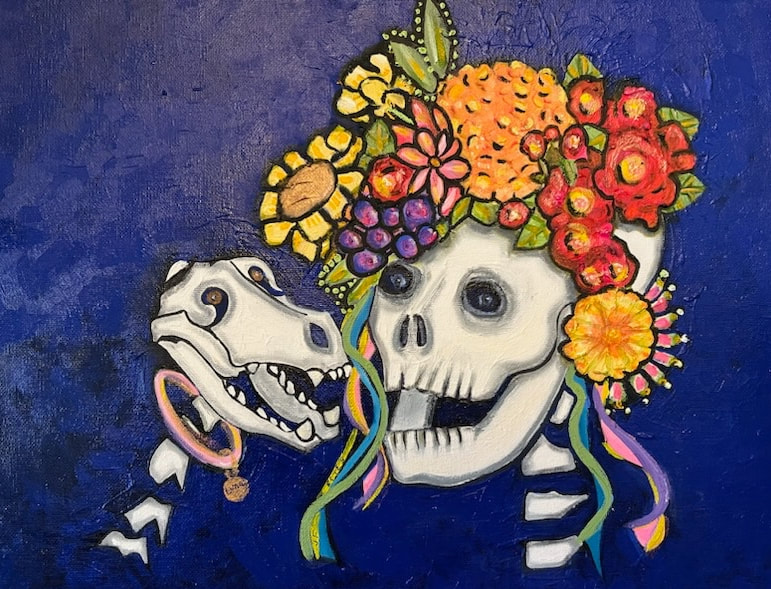October 24, 2023
Frontier Times Museum to host Day of the Dead Family Activity Day
By Rebecca Norton
Executive Director, Frontier Times Museum
Halloween is not the only day of the year spirits return to visit the living. In South Texas, Mexico, and parts of Central America, on Dia de los Muertos, or Day of the Dead, altars are created to welcome spirits of passed love ones back to earth.
The Frontier Times Museum will host a Día de los Muertos Family Activity Day on Saturday, Oct. 28, from 10 a.m. to 4 p.m. Children are invited to make their own Sugar Skull Mask and can learn how to make Mexican paper flowers. Each child will be given a Day of the Dead information wheel (while supplies last) so they can learn about this fascinating holiday. Enjoy traditional Mexican cookies and aqua frescas while viewing the museum’s Día de los Muertos altar. All activities are free with museum admission.
The Day of the Dead traces its earliest roots to the Aztec people of central Mexico. On special days throughout the year, the Aztecs placed skulls in their temples to honor their dead. Once the Spanish conquered the Aztec empire in the 16th century, the Catholic Church moved these celebrations to the Catholic holidays of All Saints Day and All Souls Day on Nov. 1 and 2. The holiday combines indigenous traditions and symbols, such as the use of skulls, with the Catholic belief of an afterlife.
The centerpiece of the Mexican celebration is an altar, or ofrenda, built in private homes and cemeteries to welcome spirits back to the realm of the living. Altar offerings include favorite foods such as tamales, and treats the departed loved ones enjoyed in life such as pastries, alcohol and cigarettes. Other items that might adorn an alter are family photos and a candle for each dead relative, as well as pictures of saints, particularly the Blessed Virgin Mary and Our Lady of Guadalupe. Small toys and candy are placed for the spirits of children. Marigolds and marigold petals are traditionally used because their scent is believed to guide the wandering souls back home. Water is placed on the altar to quench the thirst of the departed after a long journey and salt which stops the souls of the dead from being corrupted by earthly temptations. The offerings are to keep the spirits happy so they will in turn provide protection, good luck and wisdom to their families.
Texas artist Joan Estes has created an elaborate Dia de los Muertos altar exclusively for the Frontier Times Museum. Along with the altar, Estes is displaying a series of original artwork that depict the calaca, or skeletons, in various poses and costumes. Museum staff has also created a community altar where everyone is invited to bring a personal offering, such as a photograph, favorite food, or a token of a loved one who has died.
Estes’ artwork and the two altars will be on display in the museum’s Doane Western Art gallery from Oct. 24 through Nov. 4. Your ofrenda may be brought by the museum anytime during these dates.
The Frontier Times Museum will host a Día de los Muertos Family Activity Day on Saturday, Oct. 28, from 10 a.m. to 4 p.m. Children are invited to make their own Sugar Skull Mask and can learn how to make Mexican paper flowers. Each child will be given a Day of the Dead information wheel (while supplies last) so they can learn about this fascinating holiday. Enjoy traditional Mexican cookies and aqua frescas while viewing the museum’s Día de los Muertos altar. All activities are free with museum admission.
The Day of the Dead traces its earliest roots to the Aztec people of central Mexico. On special days throughout the year, the Aztecs placed skulls in their temples to honor their dead. Once the Spanish conquered the Aztec empire in the 16th century, the Catholic Church moved these celebrations to the Catholic holidays of All Saints Day and All Souls Day on Nov. 1 and 2. The holiday combines indigenous traditions and symbols, such as the use of skulls, with the Catholic belief of an afterlife.
The centerpiece of the Mexican celebration is an altar, or ofrenda, built in private homes and cemeteries to welcome spirits back to the realm of the living. Altar offerings include favorite foods such as tamales, and treats the departed loved ones enjoyed in life such as pastries, alcohol and cigarettes. Other items that might adorn an alter are family photos and a candle for each dead relative, as well as pictures of saints, particularly the Blessed Virgin Mary and Our Lady of Guadalupe. Small toys and candy are placed for the spirits of children. Marigolds and marigold petals are traditionally used because their scent is believed to guide the wandering souls back home. Water is placed on the altar to quench the thirst of the departed after a long journey and salt which stops the souls of the dead from being corrupted by earthly temptations. The offerings are to keep the spirits happy so they will in turn provide protection, good luck and wisdom to their families.
Texas artist Joan Estes has created an elaborate Dia de los Muertos altar exclusively for the Frontier Times Museum. Along with the altar, Estes is displaying a series of original artwork that depict the calaca, or skeletons, in various poses and costumes. Museum staff has also created a community altar where everyone is invited to bring a personal offering, such as a photograph, favorite food, or a token of a loved one who has died.
Estes’ artwork and the two altars will be on display in the museum’s Doane Western Art gallery from Oct. 24 through Nov. 4. Your ofrenda may be brought by the museum anytime during these dates.



